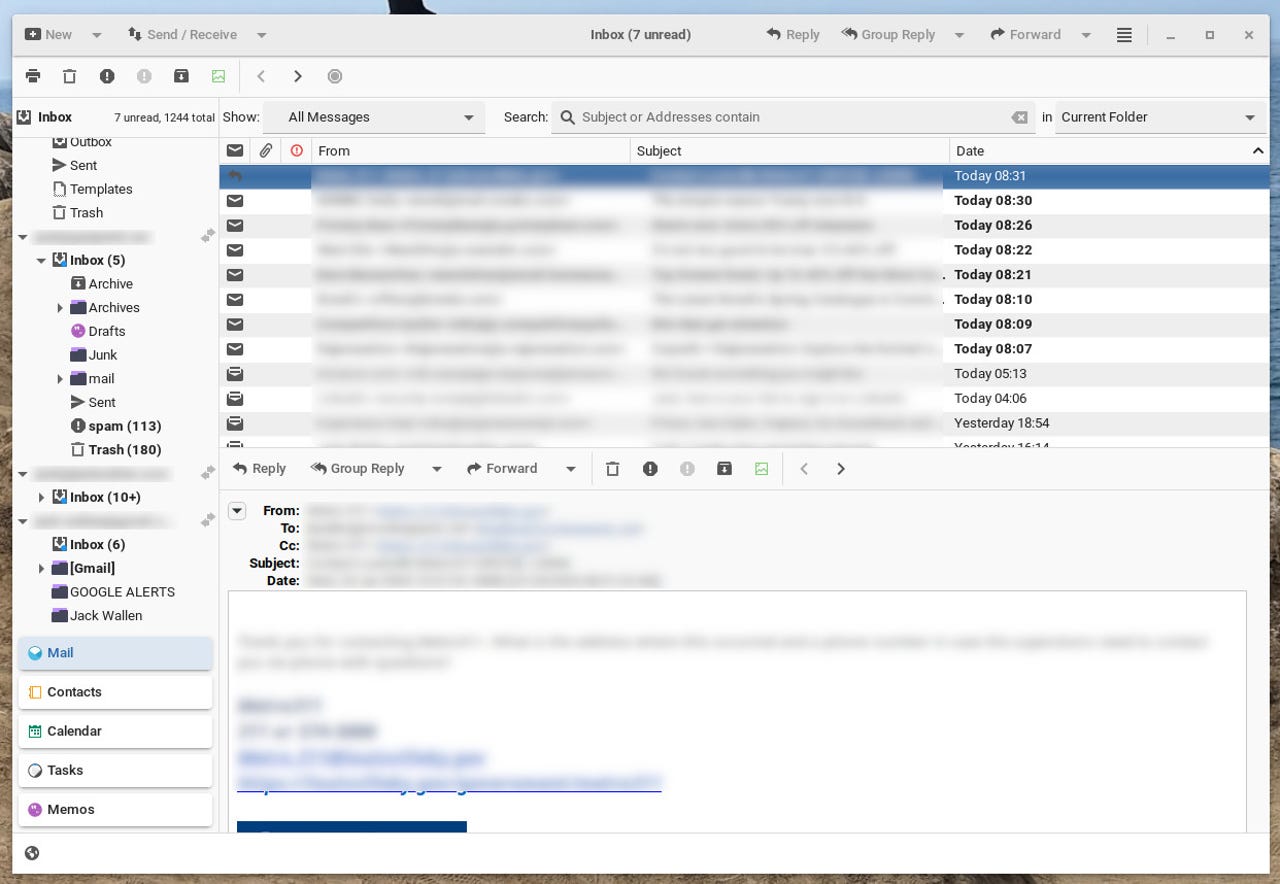
Evolution has all the tools you need in a groupware suite. Jack Wallen/ZDNET
ZDNET’s key takeaways
- Evolution is available to install (for free) from any Linux app store or the command line.
- It has all the tools needed to manage emails, calendars, tasks, contacts, and memos. The UI has a modern feel and setup is user-friendly. Supports IMAP, POP, Gmail, Exchange, and more.
- It can sometimes (randomly) forget your account SMTP passwords.
Linux has come a long way since I first started using it in 1997. When I think about it, there’s not a single aspect of the operating system that hasn’t dramatically improved. From stability, security, interoperability, amount of available software, GUIs — it’s all been a steady climb upward.
There has been, however, one issue lingering around since the days that Thunderbird development started to stagnate: The lack of quality email clients.
Also: The best email hosting services to protect your data
I realize that’s a strange problem to have in these days of cloud-based services. But I tend to prefer my email to be housed in its own application. Besides, I have numerous email accounts I have to check and I don’t want to add even more tabs to my web browser. To that end, I’ve always preferred to keep the management of emails in a traditional desktop client.
In my search for a high-quality Linux email client, I wrote about how I’d switched to the Blue Mail email client but — since that writing — I discovered that Blue Mail had become very slow. Selecting and deleting emails was a chore that took considerably longer than it should. On top of that, Blue Mail would randomly crash on me.
Mulling over the other email client options, I found each one to have some issues:
- Thunderbird – out-of-date UI.
- Claws Mail – out-of-date UI, finicky, and not exactly the most user-friendly option.
- Geary – too limited.
- Balsa – is it still in development?
- Slypheed – see all of the above.
- Kmail – Native to KDE (which is not my desktop of choice).
- Betterbird – a better Thunderbird but it still leans on an out-of-date UI.
There are also text-only email clients but I’m not going back to those old days of email.
Also: Zorin OS is exactly what a desktop operating system should be
That leaves one option among the more popular email clients, one that I haven’t considered for some time. That option is Evolution.
Evolution is to Linux, what Outlook used to be to Windows. It’s called a groupware suite because it groups all the tools you need into one. It has:
- Calendar
- Contacts
- Tasks
- Memos
I’ve never been a big fan of groupware suites but that’s not the thing that has prevented me from considering Evolution for years. To me, Evolution was the epitome of buggy, bloated software, something Linux wasn’t exactly known for. Because of that, I hadn’t given it a fair shake. But when Blue Mail decided to show its true nature to me, I realized I might as well give Evolution another go. It had been years and I was hoping things had changed.
Also: Thinking about switching to Linux? 9 things you need to know
To my great relief, they had. Instead of being a bloated, crash-prone application, Evolution has become a responsive, stable tool sporting a much more modern UI. Even better, Evolution can now better handle my massive Gmail account without crumbling under the weight of so many emails.
I’ve even found myself dipping into the other Evolution tools — something I never thought I’d do. I can check my Google Calendar without having to turn back to my browser.
The Evolution Calendar tool is quite good and even gives read/write access to Google Calendar. Screenshot by Jack Wallen/ZDNET
The only problem I’ve run into involves Tasks from my Google Calendar. Apparently, I’d once created several tasks — and they all appeared in the Evolution Calendar app under Tasks. Deleting them has been difficult, as Evolution is not capable of removing any task found within a folder. (I can’t be certain, but I believe those tasks came from Google Keep — which I use every day.) I was finally able to get rid of them but I had to do it in groups of 25. Now, with that task list empty, I felt as though everything was fresh and ready to go.
Also: This Linux distribution is an audio content creator’s paradise
So far, I’ve been using Evolution for about two weeks and the Tasks issue is the only problem I’ve come across. Everything else has been exactly what I’d hoped for.
For those interested in installing Evolution, it’s quite simple. You can open your desktop app store, search for Evolution, and click Install to add it.
Installing Evolution is just a click away. Jack Wallen/ZDNET
Once installed, open it from your desktop menu, and you’ll be greeted by the account setup wizard, where you plug in your details and let the app do the work.
Also: How to get to Inbox Zero in no time at all – and stay there
It’s been a relief to finally land on an email client that checks all the boxes for me; the fact that it’s open-source makes it all the better.
If you’ve not given Evolution a try (or gave up on it as I did years ago), I recommend you give it another go. It’s not the same bloated, buggy groupware it once was.























